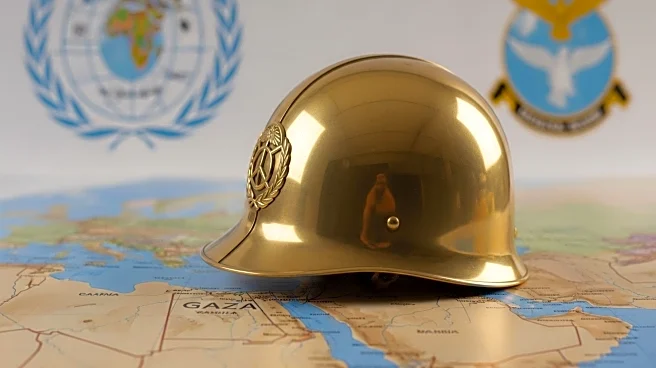What's Happening?
Retired General Wesley Clark has addressed the complexities involved in organizing a stabilizing force in Gaza, particularly focusing on the challenges of disarming Hamas. Clark, who has experience in military operations, highlighted the difficulties the U.S. faces in the region, emphasizing the need for a coordinated international effort to ensure stability. The discussion comes amid ongoing tensions and violence in Gaza, where various factions, including Hamas, have been involved in prolonged conflict. Clark's insights provide a military perspective on the geopolitical and security challenges in the area, underscoring the importance of strategic planning and international cooperation.
Why It's Important?
The situation in Gaza is a critical issue for U.S. foreign policy and international security. The challenges outlined by Wesley Clark highlight the complexities of disarming militant groups like Hamas, which have significant implications for regional stability and peace efforts. Successful stabilization in Gaza could lead to improved relations between Israel and Palestine, potentially reducing the risk of broader conflict in the Middle East. The U.S. and its allies stand to gain from a peaceful resolution, which could enhance diplomatic ties and reduce the need for military intervention. Conversely, failure to address these challenges could exacerbate tensions and lead to further instability.
What's Next?
The next steps involve diplomatic efforts to build a coalition capable of addressing the security challenges in Gaza. This includes engaging with regional partners and international organizations to develop a comprehensive strategy for disarmament and stabilization. Political leaders and military strategists will need to consider the implications of various approaches, balancing the need for security with humanitarian concerns. The international community's response will be crucial in determining the success of these efforts, with potential reactions from major stakeholders influencing the outcome.
Beyond the Headlines
Beyond the immediate security concerns, the situation in Gaza raises ethical and humanitarian questions. The impact on civilian populations, including displacement and access to essential services, is a significant concern. Long-term solutions must address these issues, ensuring that stabilization efforts do not exacerbate existing humanitarian crises. Additionally, the legal implications of military interventions and the role of international law in conflict resolution are important considerations for policymakers.








